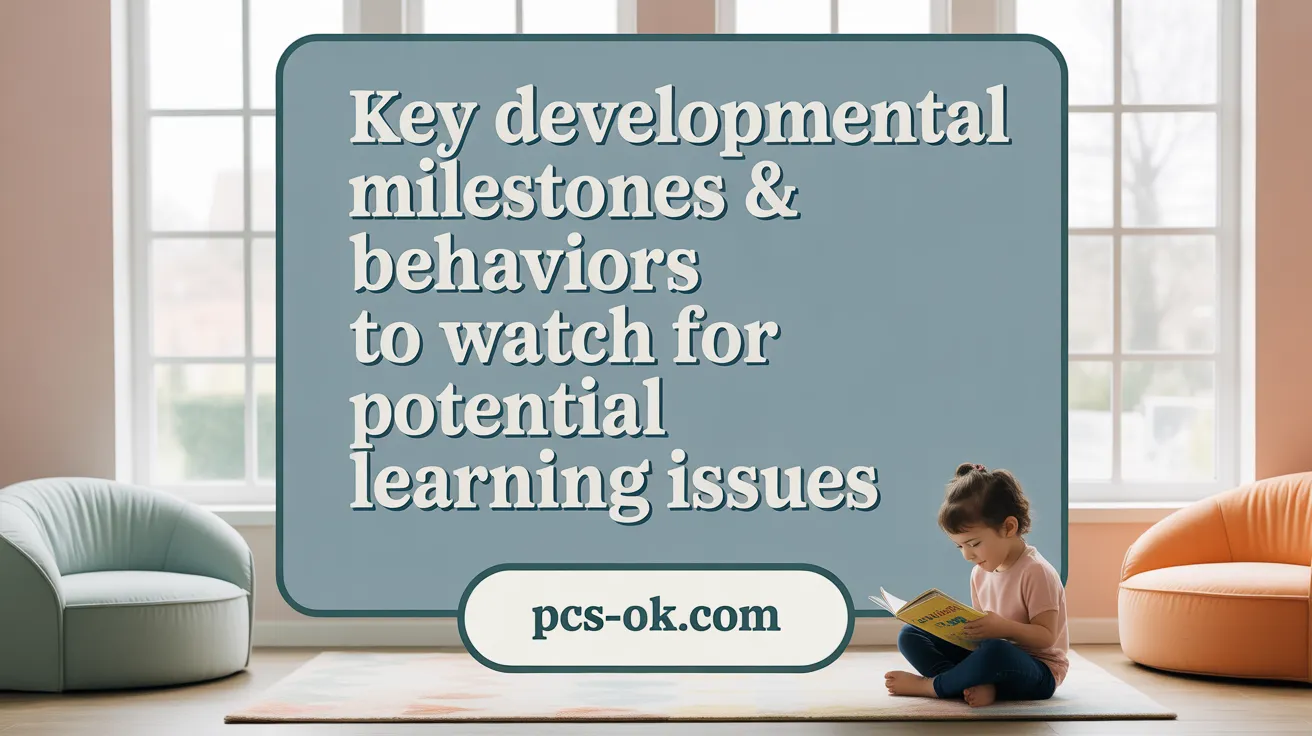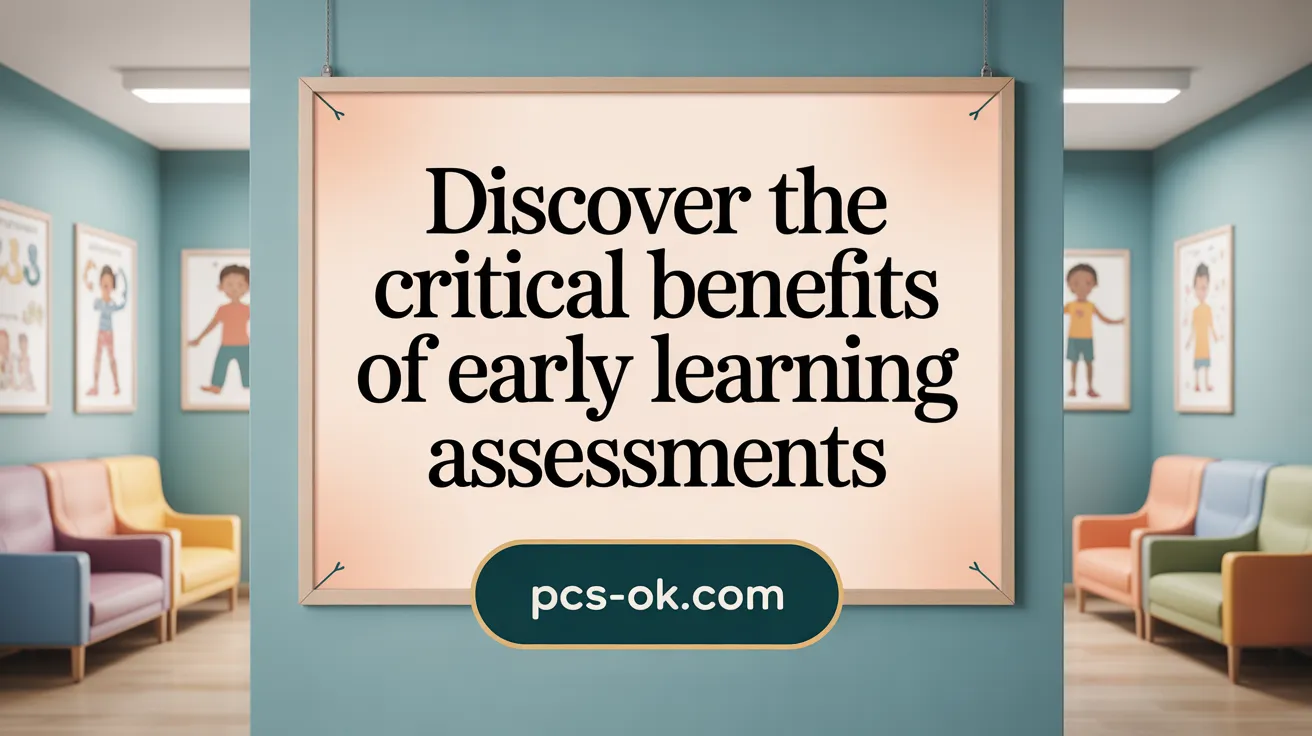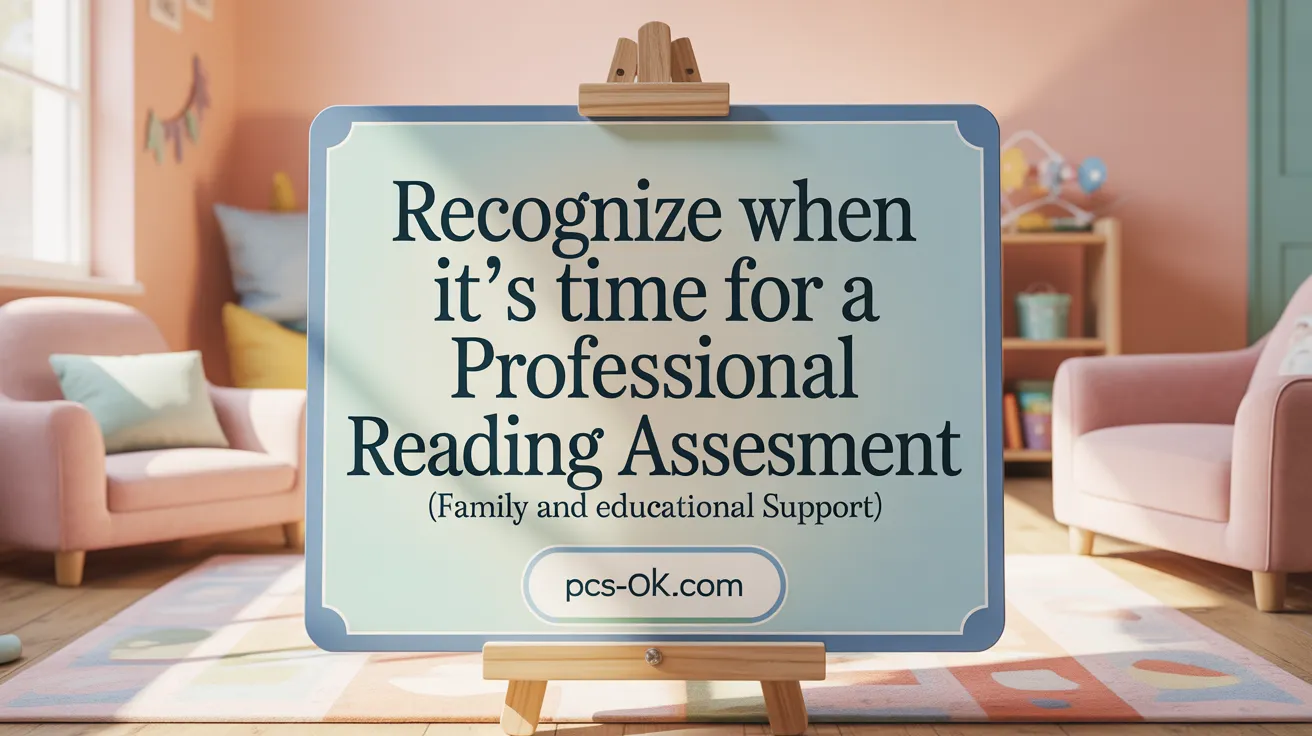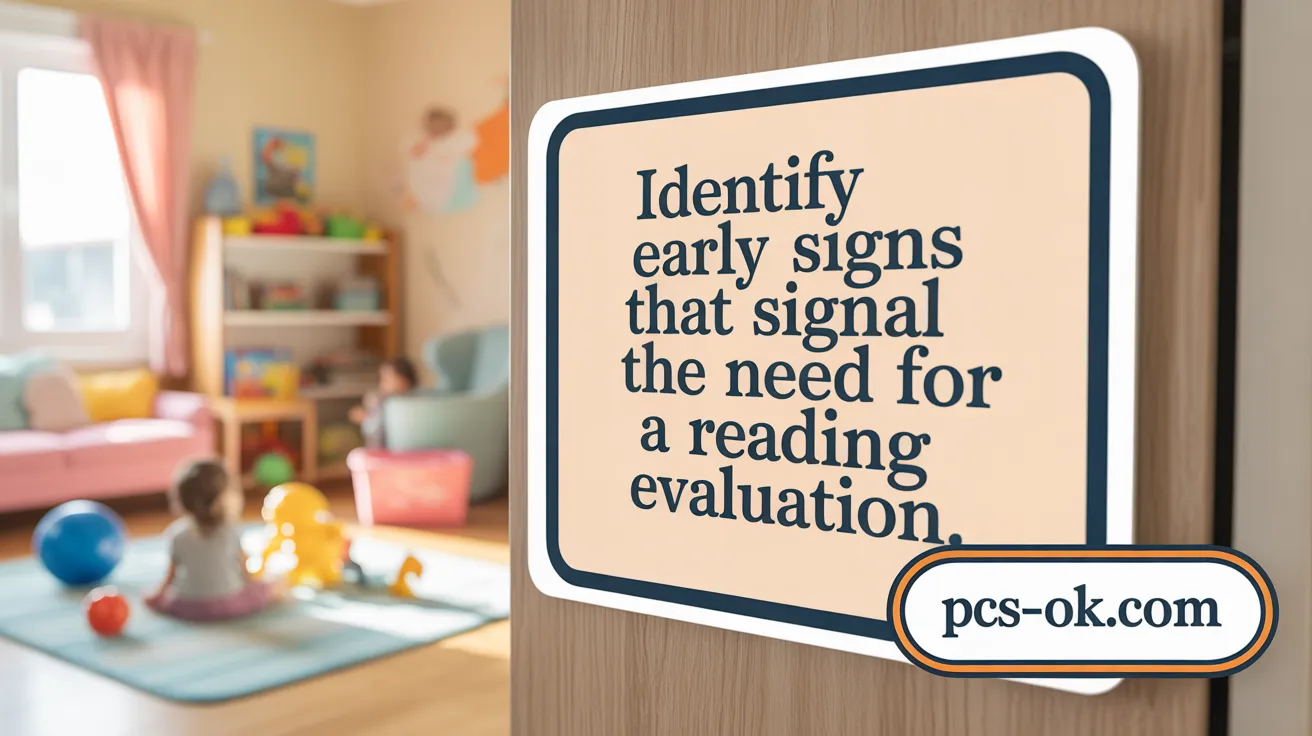Signs It’s Time to Schedule a Reading Evaluation for your Child
Understanding When Your Child Needs a Reading Evaluation
Identifying reading or learning difficulties early can transform a child’s educational journey. Parents and educators who recognize the early warning signs and understand the evaluation process empower children to receive timely support, fostering academic growth and confidence. This article explores the critical signs indicating when to schedule a reading evaluation for your child, the benefits of early assessment, and practical guidance on navigating the evaluation process.
Recognizing Early Signs of Reading Difficulties

What are some early signs that a child might be experiencing reading or learning difficulties?
Identifying reading struggles at an early stage can significantly impact a child’s academic journey. Common signs include difficulty recognizing letter names and sounds, which is often noticeable in preschool and kindergarten. Children who struggle with rhyming or manipulating sounds in words—such as adding, subtracting, or blending phonemes—may also exhibit early warning signals.
Another indicator is difficulty with memory for sight words, leading to slow reading and frequent guessing. Children with decoding issues might sound out words laboriously, pause often, and read without expression, affecting overall fluency and comprehension.
Behaviorally, children who display avoidance or frustration during reading activities, or become embarrassed when asked to read aloud, are also showing potential signs of difficulty. Problems with spelling, retelling stories, or understanding what they read can further suggest underlying challenges.
Monitoring these behaviors and early signs allows educators and parents to intervene promptly. Providing targeted support and explicit instruction can help foster stronger reading skills and prevent more serious difficulties later on.
Early detection through observation and assessment is crucial to support each child’s reading development, ensuring they receive the help they need at the right time.
Developmental Milestones and Behaviors Warranting Evaluation

What developmental milestones and behaviors in children warrant further assessment for reading or learning difficulties?
Monitoring a child’s developmental milestones is crucial for early identification of potential reading or learning challenges. Children should ideally begin babbling by around six months, and by their first year, they should start forming simple words. Delays in speech development, such as not babbling or struggling to produce words, are early red flags that may signal underlying issues.
As children grow, specific behaviors can indicate the need for further assessment. For instance, preschoolers who have difficulty recognizing letters, understanding rhymes, or playing with sounds in words may be experiencing phonological processing deficits. Learning to sound out words, spelling, and reading fluency should gradually improve; persistent difficulties suggest that an evaluation is warranted.
In early elementary years, children who consistently avoid reading activities, struggle to recognize common sight words, or have trouble understanding simple instructions need attention. As children progress into middle and high school, signs such as trouble maintaining organized notes, poor memory for learned material, and inconsistent academic performance become more apparent.
Behaviorally, children displaying trouble with motor coordination, attention span, or social-emotional regulation—such as hyperactivity, impulsivity, or withdrawal—may also have underlying developmental concerns impacting their ability to learn.
Overall, if a child shows ongoing difficulties across multiple domains, including speech, language, reading, writing, or behavior, even with appropriate support, a comprehensive assessment by specialists is necessary. This helps identify specific learning disabilities or developmental delays, allowing for tailored interventions that can support their academic and personal growth.
Why Early Evaluation Matters: Benefits and Importance

Why is early evaluation for reading problems important, and what benefits does it provide?
Early evaluation plays a vital role in identifying children who may struggle with reading before these difficulties interfere with their overall learning. This proactive approach helps teachers and parents recognize early signs such as trouble noticing rhymes, difficulty sounding out words, or reluctance to engage in reading activities.
By conducting assessments early, educators can develop targeted instruction to address specific weaknesses. For example, if a child shows challenges with phonological awareness or decoding skills, interventions can be tailored to strengthen these foundational areas. Early evaluation also establishes a clear baseline, allowing ongoing progress tracking and adjustments in teaching strategies.
Recognizing reading challenges early is especially critical because difficulties identified during the early grades are strong predictors of future academic success or struggle. When problems are addressed promptly, children are less likely to develop frustration and dropping confidence.
This early support is essential for preventing long-term academic issues. Furthermore, early evaluations often lead to timely eligibility for special services, including individualized education programs (IEPs) or accommodations, enabling children to achieve their full learning potential.
In summary, early assessment helps ensure that children receive the right instruction at the right time, which not only improves their reading skills but also fosters their overall educational growth and confidence.
Identifying Potential Learning Disabilities and Reading Struggles
How can parents and educators monitor and identify learning challenges?
Parents and teachers play a crucial role in noticing early signs of reading and learning difficulties. Regular observation of a child’s development and academic progress helps identify potential issues. Signs to watch for include trouble recognizing rhymes and sounds, difficulty memorizing sight words, or struggling to sound out unfamiliar words. Children who resist reading aloud, show frustration, or have trouble with spelling and organization may also exhibit signs of learning challenges.
Monitoring should begin early, especially during preschool and elementary years, when foundational skills are developing. Parents are encouraged to note whether their child shows persistent difficulty in key areas such as phonological processing, decoding, fluency, vocabulary, and comprehension. Teachers can provide insights based on classroom performance and may conduct screening tests like DIBELS or AIMSweb in kindergarten and early grades. These tools help flag children at risk for reading issues.
Effective monitoring also involves observing behaviors and emotional responses, such as embarrassment or avoidance of reading tasks. When multiple signs persist over time, and children seem to struggle more than their peers, it’s a signal to seek further assessment.
What are the differences between temporary struggles and ongoing issues?
Not all reading or learning difficulties are permanent. Temporary challenges can result from fatigue, lack of practice, or environmental factors, and often resolve with time or additional support.
However, persistent difficulties—those that do not improve despite instruction—may indicate underlying learning disabilities. For instance, a child who continually confuses letter sounds, spells in inconsistent ways, or avoids reading over several months likely needs evaluated intervention.
Signs that differentiate ongoing problems from temporary setbacks include:
- Difficulty maintaining progress despite practice
- Frustration and avoidance behaviors that increase over time
- Significant gaps compared to peers in reading fluency or comprehension
- Challenges that affect school performance and self-esteem
Recognizing these differences underscores the importance of early and comprehensive assessment when challenges persist.
What is the role of observation and professional assessment?
While keen observation by parents and teachers is vital for early detection, it must be complemented with professional assessments for an accurate diagnosis. Evaluation involves a team of specialists, including school psychologists, speech-language pathologists, and reading specialists.
Assessment procedures include reviewing developmental history, conducting cognitive and academic testing, observing behavioral and emotional functioning, and testing specific skills like phonological processing and decoding.
Results from evaluations can confirm if a child has a specific learning disability, such as dyslexia, or if difficulties are due to other factors like environmental issues or sensory impairments. The comprehensive report guides tailored interventions and accommodations.
Early identification through thorough observation and assessment enables targeted support, improving learning outcomes and emotional well-being. It also helps in determining eligibility for special education services, IEPs, and accommodations necessary for ongoing success.
Key Indicators Suggesting a Reading Evaluation Is Needed

What indicators suggest that a child may need a professional reading evaluation or assessment?
Early signs of reading difficulties often become apparent during the initial stages of learning to read. Persistent struggles such as trouble decoding unfamiliar words, slow reading pace, and frequent misreading are common red flags. Children who guess words instead of sounding them out, or who demonstrate difficulty with phonemic awareness—the ability to notice and manipulate sounds in words—may require closer assessment.
Weak phonological skills can be observed through difficulty rhyming, playing with sounds, or recognizing oral differences between words. Poor understanding of print concepts, slow naming of familiar objects, and challenges in developing vocabulary and comprehension are additional warning signs.
Difficulty with spelling—such as missing vowels, inconsistent letter use, or inability to write words containing most consonant sounds—may also indicate underlying reading issues. When these signs persist despite exposure to reading instruction, they signal the need for a professional evaluation.
Other behavioral indicators include avoidance of reading activities, expressing that reading is hard, or feelings of embarrassment when reading aloud. These emotional responses often accompany or result from ongoing frustration and can further hinder development.
An early assessment involves screening tools like DIBELS or AIMSweb to identify at-risk children. If results show deficits in areas such as decoding, fluency, vocabulary, or comprehension, a comprehensive diagnostic evaluation is recommended.
This evaluation aims to determine specific difficulties, rule out other causes, and provide a clear profile of the child’s strengths and weaknesses. Based on findings, tailored intervention strategies can be developed to support reading growth.
Early assessment plays a vital role in preventing long-term struggles. When signs of difficulty are recognized—whether through informal observations or formal screening—consulting with specialists such as school psychologists or speech-language pathologists ensures timely support.
In summary, children showing persistent issues with decoding, fluency, phonemic awareness, spelling, or emotional responses to reading should be evaluated professionally. Addressing these signs early helps foster a positive relationship with reading, paving the way for academic success and confidence.
Recognizing Symptoms and Red Flags for Evaluation

What symptoms or red flags should prompt parents or educators to seek a professional evaluation for a child’s reading or learning abilities?
Identifying early warning signs of reading difficulties is crucial for providing timely support. Children who experience pronounced issues with phonemic awareness—such as difficulty rhyming, playing with sounds, or manipulating syllables—may be showing signs of underlying learning struggles. Struggles with recognizing common sight words or sounding out unfamiliar words consistently indicate decoding issues.
Delayed speech development or trouble learning letter and number symbols are significant early indicators, especially in preschool and early elementary years. When a child cannot follow multi-step instructions or shows persistent difficulty with basic reading and writing tasks compared to peers, these are signals for concern.
Behavioral responses also serve as important clues. Reluctance or refusal to read aloud, avoidance of reading activities, or evident frustration, embarrassment, or anxiety during reading tasks suggest that the child may be struggling more than they can articulate.
It’s also vital to consider the child’s family history. A background of reading difficulties in relatives can increase the likelihood of similar challenges, warranting an evaluation.
Children who lag in decoding skills, reading fluency, comprehension, spelling, or exhibit inconsistent progress despite classroom support should undergo assessment. Persistent difficulty grasping sound-letter relationships, slow word recognition, or poor spelling skills signal the need for professional evaluation.
Early signs like poor letter recognition, difficulty differentiating sounds, or trouble learning to manipulate sounds in words are red flags, especially when observed over time.
In summary, if a child displays ongoing struggles with phonemic awareness, delays in speech, trouble recognizing symbols, or exhibits behaviors indicating frustration with reading tasks, it’s essential to seek a comprehensive evaluation. Doing so helps pinpoint the specific causes and paves the way for targeted interventions, enabling the child to develop stronger reading skills and confidence.
When to Schedule a Diagnostic or Psychoeducational Assessment
When is the appropriate time to consider scheduling a diagnostic or psychoeducational assessment for a child suspected of having learning difficulties?
Deciding when to schedule an assessment depends on observing persistent signs of difficulty that do not improve despite targeted efforts. If a child struggles with reading, spelling, math, organization, or shows signs of frustration and behavioral challenges, these may be indicators that a comprehensive evaluation is needed.
Most experts suggest that children are ready for formal testing around age 8. By this age, assessment tools are more reliable, and educational challenges are clearer as curriculum demands increase. Conducting the evaluation during a period of stability—when the child is not facing major life changes or high stress—is essential for obtaining accurate results.
Early assessment can be crucial. Identifying potential learning disabilities early allows for timely support, specialized instruction, and accommodations that can significantly improve academic progress and emotional well-being.
It’s also important to consider that if a child’s difficulties are evident even before age 8, especially in preschool or early elementary years, parent and teacher observations should prompt consultation with specialists. However, formal assessments are typically more informative and valid starting around age 8, when cognitive and academic skills can be measured more effectively.
Overall, referral for testing should be made when ongoing challenges persist despite interventions, ensuring that children receive the appropriate support tailored to their needs. This proactive approach fosters better educational experiences and helps mitigate long-term academic frustration.
Understanding the Reading and Learning Evaluation Process
How does one go about seeking an evaluation for reading or learning difficulties?
The process typically starts with parents, teachers, or caregivers noticing signs that a child is struggling with reading, writing, or other academic skills. Once concerns are raised, they can request an assessment through the child’s school or opt for a private evaluation. Schools may refer students based on ongoing academic challenges or behavioral issues, while parents can initiate evaluations independently.
The evaluation itself involves a series of systematic assessments conducted by qualified professionals, such as school psychologists or speech-language pathologists. These assessments include a combination of formal standardized tests and informal observations aimed at measuring areas like phonological awareness, decoding ability, fluency, comprehension, vocabulary, and processing skills.
Tools used in these assessments can include screening tests like DIBELS or AIMSweb, and comprehensive batteries like the CTOPP or TOWRE. The evaluation process also considers developmental history, behavioral observations, and academic records. The goal is to gather a complete picture of the child’s learning profile.
Following testing, a detailed report is compiled. This report highlights the child’s strengths and difficulties, includes test scores, developmental background, and offers a tentative diagnosis if appropriate. The information gained guides personalized interventions, instructional strategies, and determines eligibility for services such as special education or accommodations.
Parental involvement is crucial during this process, ensuring culturally appropriate practices and promoting understanding of the child’s unique needs. The evaluation ultimately supports the goal of providing effective educational support tailored to the child’s specific learning profile.
| Step | Description | Additional Details |
|---|---|---|
| 1. Concern identification | Noticing difficulties or delays in reading or learning | Can be observed by parents, teachers, or caregivers |
| 2. Request for evaluation | Initiating an assessment through school or private provider | Based on ongoing challenges or specific concerns |
| 3. Assessment administration | Conducting standardized tests and classroom observations | Involves tests like DIBELS, CTOPP, etc. |
| 4. Report compilation | Documenting findings, scores, and assessments | Includes developmental and educational history |
| 5. Interpretation and planning | Analyzing results to determine needs and interventions | Guides personalized support strategies |
What types of assessments are administered?
A psycho-educational assessment is comprehensive, measuring both cognitive and academic functioning. It evaluates areas such as verbal and non-verbal reasoning, language skills, decoding, word recognition, spelling, reading comprehension, and processing speed. Behavioral and emotional assessments may also be included if behavioral issues are related.
Who are the professionals involved?
Professionals involved in the evaluation process include school psychologists, speech-language pathologists, educational diagnosticians, and sometimes pediatric neuropsychologists. These experts are trained to interpret test results accurately and provide insights into the child’s learning profile.
How do evaluation results influence intervention and services?
The detailed report from the assessment helps in identifying specific learning challenges, such as dyslexia or other learning disabilities. This information guides the creation of targeted interventions, including specialized instruction, assistive technologies, or therapy. It also determines if the child qualifies for special education services or accommodations, both in school and post-secondary settings. Regular reevaluations every three years help adjust supports to meet evolving needs.
By systematically identifying strengths and weaknesses, evaluations form the foundation for effective educational planning, ensuring children receive the appropriate support to succeed academically and socially.
Leveraging Evaluation Outcomes for Effective Support
How does evaluation inform tailored intervention plans?
Evaluation provides a detailed picture of a child’s specific reading and learning strengths and weaknesses. It includes assessments of phonological processing, decoding skills, vocabulary, and reading comprehension. Based on these results, educators and specialists can design targeted interventions that focus on the child’s particular needs. For example, if a child struggles mainly with phonemic awareness, intervention might prioritize phonics and sound manipulation activities. This personalized approach helps children develop foundational skills at their own pace, increasing the chances of improving their reading ability.
How does evaluation determine eligibility for special education and accommodations?
The documentation from a formal evaluation is crucial in establishing whether a child qualifies for special educational services. Many states use specific criteria outlined in laws like the Individuals with Disabilities Education Act (IDEA). If the assessment shows significant difficulties that impact academic performance, the child may be eligible for an Individualized Education Program (IEP) or other accommodations. These accommodations can include extended test times, oral reading support, adaptive technology, or specialized instruction tailored to the child’s needs.
Why is ongoing assessment and support important?
Learning needs can change over time, making reevaluations essential every three years or as needed. Continued assessment helps monitor progress and adjust interventions accordingly. Early support can prevent frustration and reduce the risk of falling behind academically. It also ensures that children with learning disabilities receive the appropriate resources and adjustments to thrive both in school and socially. Sustained support fosters confidence and promotes long-term academic success.
What is the role of parents and educators after an evaluation?
Parents and teachers play vital roles in translating evaluation findings into effective action. Parents should communicate openly with educators about concerns and participate in developing intervention plans. Teachers can implement recommended strategies and monitor the child’s progress. Collaboration ensures that interventions are consistent across settings. Additionally, parents can seek private evaluations for a broader understanding and advocate for necessary accommodations. Both parents and educators are responsible for providing encouragement and creating a supportive environment that recognizes each child’s unique learning needs.
| Aspect | Importance | Actions Involved |
|---|---|---|
| Individualized plans | Tailor support to needs | Develop IEPs or 504 plans |
| Monitoring progress | Ensure interventions work | Conduct regular reassessments |
| Parent-educator collaboration | Unified support approach | Share insights and implement strategies |
| Ongoing support | Sustain improvements | Adjust interventions as needed |
Taking the Next Steps Towards Helping Your Child Thrive
Scheduling a reading evaluation is a crucial step when a child shows persistent signs of reading or learning difficulties. Early identification through careful observation and professional assessment can unlock targeted interventions that make a profound difference in academic success and self-confidence. By understanding the signs, the evaluation process, and how to use the results effectively, parents and educators play an essential role in supporting every child’s unique learning journey. Remember, timely support opens the door to lifelong learning and achievement.
References
- Is Your Child Having Trouble Reading? Warning Signs and …
- Testing and Evaluation
- How Do I Know If My Child Needs a Learning Evaluation?
- Early Signs of a Reading Difficulty
- How to Evaluate a Child for Learning Disabilities
- When to Consider a Learning Evaluation
- Know the signs that your child needs a psychoeducational …
- 4 Signs Your Child Needs Reading Help
